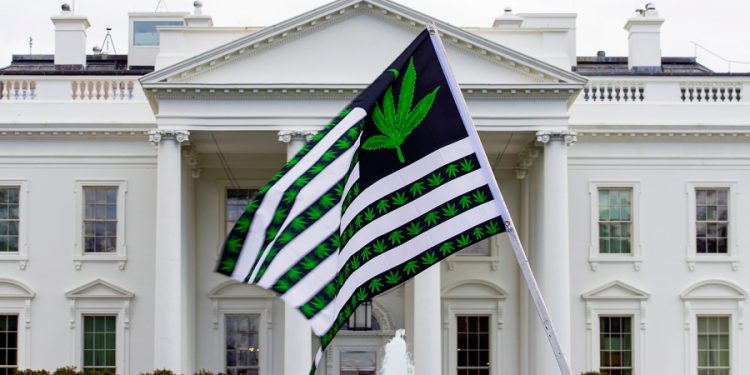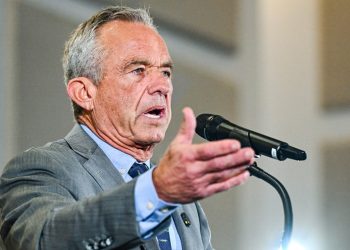President Biden on Thursday announced mass pardons for federal marijuana possession, a step long sought by advocates and the most significant action on marijuana his administration has taken to date. He also directed federal agencies to conduct a review of whether marijuana should remain a Schedule I substance.
Advocates, lawmakers and experts cheered the moves, but acknowledged there are limitations. Here’s what Biden’s marijuana order does, and does not do:
People convicted of simple possession will be pardoned
The pardons will clear everyone convicted on federal charges of simple possession since it first became a crime. The pardons will also extend to anyone convicted under District of Columbia drug laws, since D.C. is not a state and charges in D.C. are technically considered federal charges.
Possession of marijuana is a misdemeanor punishable by up to one year in jail and a minimum fine of $1,000 for a first conviction.
More than 6,500 people were convicted of simple possession between 1992 and 2021 under federal law, and thousands more under D.C. code, White House officials said. But the vast majority of convictions happen at the state level. The White House appealed to governors to follow suit and issue the same pardon.
A pardon won’t mean people’s records will be expunged, but the Justice Department said it would remove “civil disabilities,” which include restrictions on the right to vote, to hold office, or to sit on a jury.
The pardons won’t cover any other marijuana offenses
Any other charges beyond simple possession, like distribution or possession with intent to distribute, are not covered by Biden’s announcement.
As a result, nobody is getting released from jail as a result of the pardons. There isn’t anyone currently in federal prison solely for simple possession, White House officials said.
“There are thousands of people who have prior federal convictions for marijuana possession, who may be denied employment, housing, or educational opportunities as a result. My action will help relieve the collateral consequences arising from these convictions,” Biden said in a statement.
It moves the federal government more in line with states
Currently, 37 states and the District of Columbia have legalized medical marijuana, and 19 states have legal adult-use marijuana. Five states have legalization on the ballot in November.
Yet even as states moved toward greater acceptance, the federal government has continued to focus on prohibition, treating marijuana as a dangerously illegal drug with no potential benefits.
“We have something really crazy going on that can’t go on anymore, which is that there are active state legal markets that are doing billions of dollars of commerce. And this should be treated as a regulated product. And yet the federal government has kind of been operating under almost a ‘Don’t Ask, Don’t Tell’ policy here,” said Andrew Freedman, executive director of the Coalition for Cannabis Policy, Education and Regulation.
During the 2020 campaign, Biden was the only Democratic presidential candidate who did not support federal descheduling. During his time in Congress, Biden authored some of the very laws that advocates say has led to a disproportionate number of incarcerated Black people for relatively minor offenses.
So the announcement represents a major shift not just in the federal approach to marijuana, but also in President Biden’s.
It doesn’t decriminalize marijuana
Biden’s order is a step towards decriminalization, but it doesn’t go all the way. That is something Congress will have to do.
Senate Majority Leader Charles Schumer (D-N.Y.) introduced legislation to expunge some criminal records and remove marijuana from the Controlled Substances Act, but it currently doesn’t have the votes to pass.
“Members of Congress have been working on this issue with one significant bill passing the House. That effort has stalled and we are almost at the end of this Congress,” a senior administration official said Thursday.
Freedman said Biden’s apparent evolution on marijuana could be the catalyst for Congress to act.
It doesn’t change how marijuana is scheduled
Biden ordered the Departments of Justice and Health and Human Services to conduct a review of whether to reschedule marijuana.
Marijuana is a Schedule I drug, meaning it is in the same category as drugs like heroin and LSD, and more serious than fentanyl. According to the federal government, it has a high potential for abuse and no accepted medical value.
Freedman, who served as Colorado’s cannabis czar in 2014 when the state legalized marijuana, said the process to reschedule a drug can typically take 5 to 10 years. He said the likely outcome of reclassifying marijuana as a Schedule 2 substance — meaning it could have some medicinal benefits but is still harmful — would have a fairly limited impact.
“And so I think there’s more to gain from using this as a moment for a national conversation [about the limits of prohibition] than to talk through the merits of rescheduling,” Freedman said.
Even Democratic lawmakers urged Biden to do more than just conduct a review.
“A review by HHS of how cannabis is scheduled is welcome, but those of us who have been advocating for reform, we already know that a comprehensive federal solution is needed,” Sen. Ron Wyden (D-Ore.) said in a statement on Thursday.














